
Stories about Navajo Four Seasons, Native American Cradleboards, Pia Toya Story, Parent Committee Special Projects, and Powwow Dancing.
- Subject:
- Arts and Humanities
- Dance
- Literature
- Date Added:
- 03/16/2021

Stories about Navajo Four Seasons, Native American Cradleboards, Pia Toya Story, Parent Committee Special Projects, and Powwow Dancing.
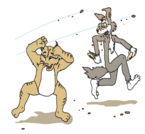
According to Navajo tradition, this is a winter tale. Coyote stories should only be told in the winter time. This Navajo story booklet is part of the Native American Indian Literacy Project storybook series for the six main Utah Tribal Nations. The project was led by Shirlee A. Silversmith, American Indian education specialist for the Utah State Office of Education. There are five stories per Tribe, with a total of 30 booklets, plus an ABC book. The set of Indian Tribal stories may be utilized by elementary classroom teachers to (1) develop an understanding and appreciation of Native American culture and societal contributions (2) provide a genre of text for the application of reading strategies, and (3) facilitate the mastery of various Utah Core Content Curriculum objectives. The Native American Indian Literacy Project was made possible by funds from the Utah State Office of Education (USOE). It is a joint effort of the USOE and San Juan School District Media Center.
The original set has 30 booklets, measuring 5.5” x 8.5” each, and illustrated by tribal members. The booklets were formatted to be printed and assembled. This version of the book has been updated to accommodate using a projector or smart board with pages appearing in order.
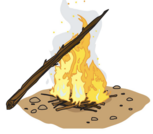
The Honeeshgish, or fire poker, is sacred to traditional Navajo. They believe that the Holy People blessed it and gave it to the Diné to use in their fireplaces, their homes, and their ceremonies. This Navajo booklet is part of the Native American Indian Literacy Project storybook series for the six main Utah Tribal Nations. The project was led by Shirlee A. Silversmith, American Indian education specialist for the Utah State Office of Education. There are five stories per Tribe, with a total of 30 booklets, plus an ABC book. The set of Indian Tribal stories may be utilized by elementary classroom teachers to (1) develop an understanding and appreciation of Native American culture and societal contributions (2) provide a genre of text for the application of reading strategies, and (3) facilitate the mastery of various Utah Core Content Curriculum objectives. The Native American Indian Literacy Project was made possible by funds from the Utah State Office of Education (USOE). It is a joint effort of the USOE and San Juan School District Media Center.
The original set has 30 booklets, measuring 5.5” x 8.5” each, and illustrated by tribal members. The booklets were formatted to be printed and assembled. This version of the book has been updated to accommodate using a projector or smart board with pages appearing in order.
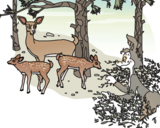
According to Navajo tradition, this is a winter tale. Coyote stories should only be told in the winter time. This Navajo story booklet is part of the Native American Indian Literacy Project storybook series for the six main Utah Tribal Nations. The project was led by Shirlee A. Silversmith, American Indian education specialist for the Utah State Office of Education. There are five stories per Tribe, with a total of 30 booklets, plus an ABC book. The set of Indian Tribal stories may be utilized by elementary classroom teachers to (1) develop an understanding and appreciation of Native American culture and societal contributions (2) provide a genre of text for the application of reading strategies, and (3) facilitate the mastery of various Utah Core Content Curriculum objectives. The Native American Indian Literacy Project was made possible by funds from the Utah State Office of Education (USOE). It is a joint effort of the USOE and San Juan School District Media Center.
The full set has 30 booklets, measuring 5.5” x 8.5” each, and illustrated by tribal members. The booklets were formatted to be printed and assembled. This means that they do not read well when using a projector or smart board because the pages will appear out of order. If a teacher did want to use the books in an electronic format, they would be best off screenshotting the pages and arranging them in a slide presentation.

To the Navajo, the owl is a bearer of bad news. When an owl appears, it may be a warning that something terrible is about to happen. When a traditional Navajo sees an owl, he prays for intervention, protection, and guidance. This Navajo booklet is part of the Native American Indian Literacy Project storybook series for the six main Utah Tribal Nations. The project was led by Shirlee A. Silversmith, American Indian education specialist for the Utah State Office of Education. There are five stories per Tribe, with a total of 30 booklets, plus an ABC book. The set of Indian Tribal stories may be utilized by elementary classroom teachers to (1) develop an understanding and appreciation of Native American culture and societal contributions (2) provide a genre of text for the application of reading strategies, and (3) facilitate the mastery of various Utah Core Content Curriculum objectives. The Native American Indian Literacy Project was made possible by funds from the Utah State Office of Education (USOE). It is a joint effort of the USOE and San Juan School District Media Center.
The full set has 30 booklets, measuring 5.5” x 8.5” each, and illustrated by tribal members. The booklets were formatted to be printed and assembled. This means that they do not read well when using a projector or smart board because the pages will appear out of order. If a teacher did want to use the books in an electronic format, they would be best off screenshotting the pages and arranging them in a slide presentation.
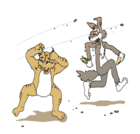
This is a Navajo tale about a character, coyote, tricking bobcat into stealing some corn. Coyote tales are traditional Navajo stories that have been told for thousands of years, passed along from family to family across the generations. As an integral part of the oral traditions of the people, Coyote stories have been used to instruct the young and as well as for guideposts to living a good life. Folded within the humor and misadventure, the listener/reader learns that the results of Coyote's selfishness, greed, tricks, and deceit are often painful and humiliating! Through repeated telling, children learn at a young age how to behave appropriately. Please respect the cultural observances for Coyote stories, books, DVDs, and audio recordings. Coyote tales are intended for the winter story-telling season only, October through February. This lesson could be used to support lessons on Fables, Tales and Native American Storytelling.
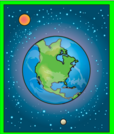
Caring for the Earth is an important part of responsible decision-making and global citizenship. Our Father Sky and Mother Earth provide for our most basic needs. We need to protect and care for our environment. Through this lesson, students will strengthen thier social and emotional learning skills by reading a Navajo legend - "Father Sky and Mother Earth." Student will explore how they can be good stewards of the Earth and Sky in protecting our natural resources.
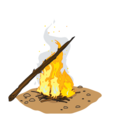
Caring for the Earth is an important part of responsible decision-making and global citizenship. The Earth provided for our most basic needs. We need to understand, care and protect our environment. Through this lesson, students will read a Navajo legend, "Honeeshgish," or fire poker, This fire tool is sacred to traditional Navajo. They believe that the Holy People blessed it and gave it to the Dinè to use in their fireplaces, their homes, and their ceremonies. Fire is both good and bad, we must be responsible for good fire use. This lesson will support fire ecology curriculum.

A short eight-minute video that discusses Navajo code talkers. This goes into details about how the langauge was taught and utilized during WWII.
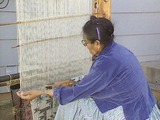
The history of Navajo Indian woman weaving wool rugs is summarized in this media item extracted from the 20-part video series A PEOPLES' HISTORY OF UTAH, written and hosted by Dean L. May, PhD (University of Utah). The series provides a sweeping view of Utah's past, from its earliest known desert beginning--from its prehistory, to the pioneer era, to the transformation from territory to state, to its critical role in the world war years and beyond.

The history of Turquoise ring by a Navajo Indian is summarized in this media item extracted from the 20-part video series A PEOPLES' HISTORY OF UTAH, written and hosted by Dean L. May, PhD (University of Utah). The series provides a sweeping view of Utah's past, from its earliest known desert beginning--from its prehistory, to the pioneer era, to the transformation from territory to state, to its critical role in the world war years and beyond.
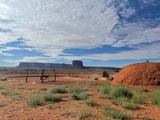
I teach in the Navajo Nation, majority of my students are Navajo. I wanted to create claymations using stop-motion retelling the Coyote stories.

On the final Some Good Education News episode of the school year, we find out how the past year has affected three seniors from different areas of Utah. Xavier Martin, Joshua Tonga, and Elizabeth “Peach” Schilling share the challenges and opportunities this year has given them. It’s a perspective you won’t want to miss!

Fry bread takes only a few ingredients to make, and it brings a lot of people together. Find out why it has special meaning for Native Americans in Something From Nothing: The Story of Fry Bread, the latest episode of YourClassical Storytime — featuring narration and music by composer Connor Chee, and illustrations by Raul Villanueva.